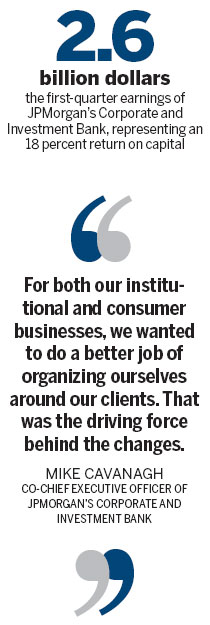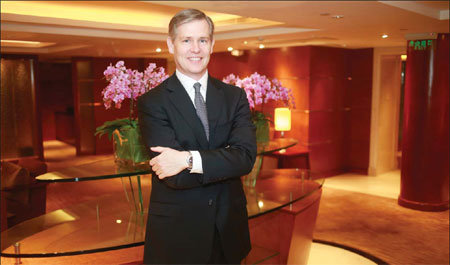A big tick for tight controls
Updated: 2013-07-12 08:49
By Chen Jia (China Daily)
|
|||||||||||
|
Mike Cavanagh, co-CEO of JPMorgan's Corporate and Investment Bank, which was created last year by merging the bank's Corporate and Investment Bank, Treasury and Securities Services and the Global Corporate Bank businesses. Feng Yongbin / China Daily |

JPMorgan executive sees china as having a key role in its fortunes
Focusing on what is truly important at the big end of business and deciding business direction according to clients' needs are central to the core values of Mike Cavanagh, co-chief executive officer of JPMorgan's Corporate and Investment Bank.
The demands of investors have really reshaped what a successful business model in banking looks like following the huge destructive global financial tsunami of 2008, the 47-year-old executive says.
JPMorgan sees China as one of the bright spots for the expansion of its global business, Cavanagh says, and the company plans to continually invest in its businesses in the country.
"This is one of the most exciting markets in the world. We have our own locally incorporated bank with seven branches across China and a number of joint ventures in asset management, securities underwriting and futures and options. We promise to continue investing and the momentum is really strong."
JPMorgan has underwritten the two largest initial public offerings in Hong Kong so far this year.
In May, China Galaxy Securities Co Ltd and Sinopec Engineering (Group) Co Ltd completed IPOs on the Hong Kong market, raising HK$8.3 billion ($1.07 billion) and HK$13.7 billion respectively.
"The world understands that China is a source of strength to the global economy, whether that's with 8 percent, 7 percent or 6 percent growth," Cavanagh says.
Cavanagh, former head of JPMorgan's Treasury and Securities Services business, became the first point of contact for decision-making when the firm aligned its Corporate and Investment Bank, Treasury and Securities Services and the Global Corporate Bank businesses a year ago.
The new combined department is called the Corporate and Investment Bank. The unification is aimed at strengthening its institutional client franchise in the industry and benefiting corporate and investor clients.
"For both our institutional and consumer businesses, we wanted to do a better job of organizing ourselves around our clients," he says. "That was the driving force behind the changes."
"I wouldn't say they were big changes, but I would say it was evolutionary."
According to a public announcement by JPMorgan, the benefits of the Corporate and Investment Bank include a shared balance sheet that can more effectively deliver credit to clients in the form most helpful to them, as well as the benefits of scale that come from combined resources, infrastructure and technology. A globally coordinated coverage team can also better support clients in an increasingly complex regulatory and economic environment with a comprehensive suite of products and services, it said.
The focusing-on-client business model is expected to drive the CIB to concentrate on improving service efficiency, optimizing many capabilities - cash management, custody, prime brokerage, trading, corporate finance and capital - under one roof and being able to deliver tailored solutions in a holistic way.
Last year, the first year JPMorgan reported the CIB as a combined unit, it achieved a net income of $8.4 billion (6.5 billion euros) on $34.3 billion in revenue, up 26 percent on all of 2011, the company said.
In the first quarter of this year, it reported $2.6 billion of earnings on $10 billion of revenue, representing an 18 percent return on capital.
"More important than the numbers, however, is what we hear from clients," says Cavanagh, who says he is satisfied with the CIB achievements so far. "It's a complicated new world that clients have to navigate."
About 61 percent of the CIB clients are international and 48 percent of its revenue is now generated from international businesses.
Cavanagh sees regulatory changes, including what are known as the Dodd-Frank implementation, Basel capital rule changes and Volcker-Vickers, as "a real challenge" this year.
To deal with the effect of Basel III regulations, the CIB has increased allocated capital reserves to $56.5 billion since the beginning of this year.
But Cavanagh believes there will be more opportunities for financial groups in underwriting capital markets because customer needs for capital are growing. His department set up a target return on equity of 16 percent this year.
Cavanagh has seen financial regulation increase over the past few years of the post-crisis era.
"Much of it is for a very good reason. We support higher levels of capital and stronger, more consistent regulatory rules."
For the United States, regulation has been tightened to address things such as differing mortgage practices and products and improving supervision methods. In the global financial industry, standards need to be set on risk-weighted assets and how capital rules apply, says Cavanagh.
"Hopefully, we will continue to see more consistency and less opportunity for regulatory arbitrage than existed previously."
New changes occurred among the big multinational financial institutions, Cavanagh says. "Banks are adapting to changes in liquidity and capital requirements, learning how to set up subsidiaries operating around the world and new rules related to certain products and services."
In the meantime, many European banks have been de-leveraging because of the stresses brought about by persistent slow economic growth, tightening regulatory requirements and sovereign debt concerns.
"For global wholesale banks like JPMorgan, we benefit from a very significant economy of scale," Cavanagh says. "We spend approximately $21 billion a year on our resources, people, technology and new products while absorbing the higher cost of regulations.
"JPMorgan has also always been very client-focused, and we know that our clients need a global partner."
Last year this financial giant provided credit and raised capital of more than $1.8 trillion for its customers. The company earned a record $21.3 billion in net income as well as $97 billion in revenue.
Jamie Dimon, CEO of JPMorgan, wrote in a letter to the company's shareholders in last year's annual report: "We are doing big things at a time that calls for just that. We will continue to do so."
However, one thing occurred last year that Dimon is "not proud of" or even "embarrassed" about. It was the "London whale", a big mistake that created up to $6.2 billion of losses from a complex derivatives trade out of JPMorgan's London offices.
Cavanagh, who can directly report to Dimon as one of the members of the company's operating committee, was appointed leader of a special team of senior bankers and traders to investigate the event that exposed the financial giant to severe criticism.
He was named "Mr Fix It" by The Wall Street Journal.
"Many of the lessons we learned were actually very simple: In businesses where you are taking market risks it's essential to have granular limits set around those activities. Controls weren't in place that should have been," Cavanagh says.
"More generally, it's important to eliminate activities that aren't core to your bigger mission."
Both talented executives and a tight regulatory system are crucial to running a company that undertakes great risk management and requires controls, Cavanagh says. "But most important is a culture of caring about those things."
chenjia1@chinadaily.com.cn
(China Daily European Weekly 07/12/2013 page20)
Today's Top News
List of approved GM food clarified
ID checks for express deliveries in Guangdong
Govt to expand elderly care
University asks freshmen to sign suicide disclaimer
Tibet gears up for new climbing season
Media asked to promote Sino-Indian ties
Shots fired at Washington Navy Yard
Minimum growth rate set at 7%
Hot Topics
Lunar probe , China growth forecasts, Emission rules get tougher, China seen through 'colored lens', International board,
Editor's Picks

|

|

|

|

|

|






